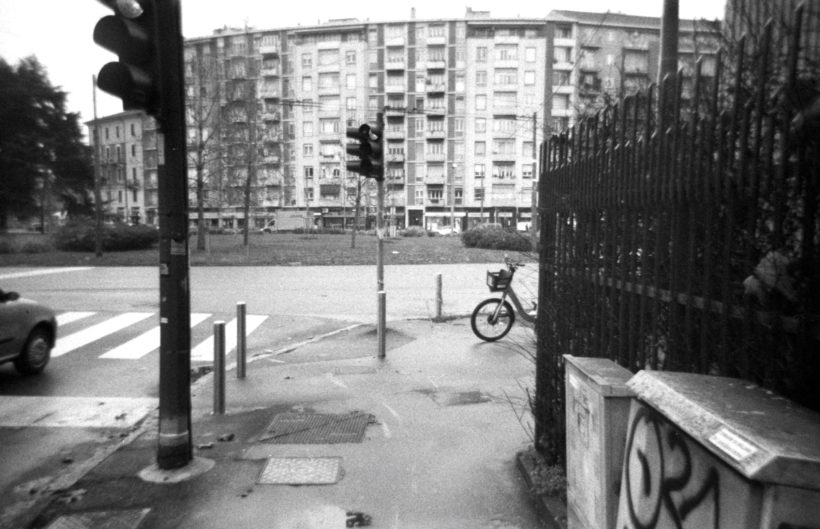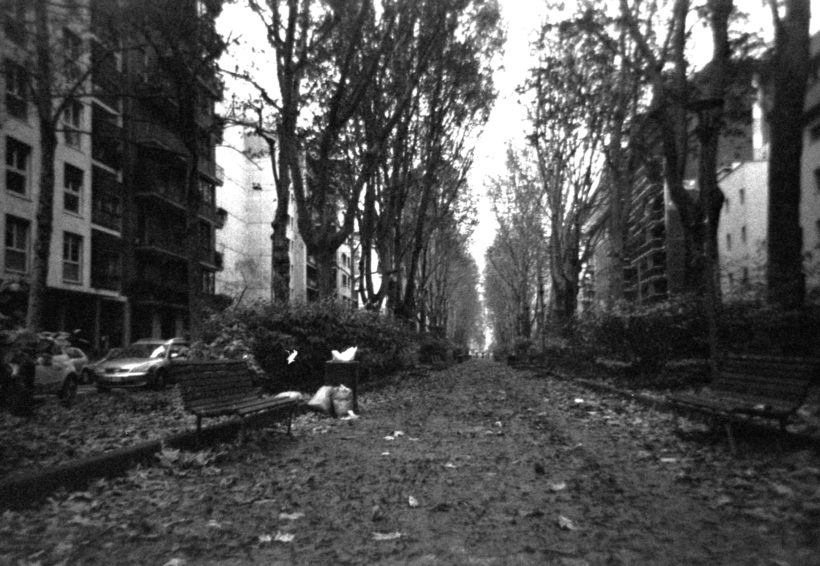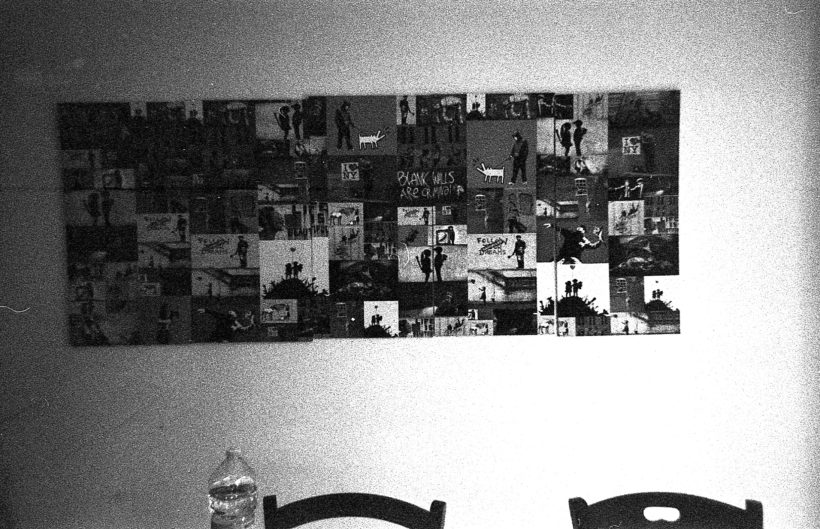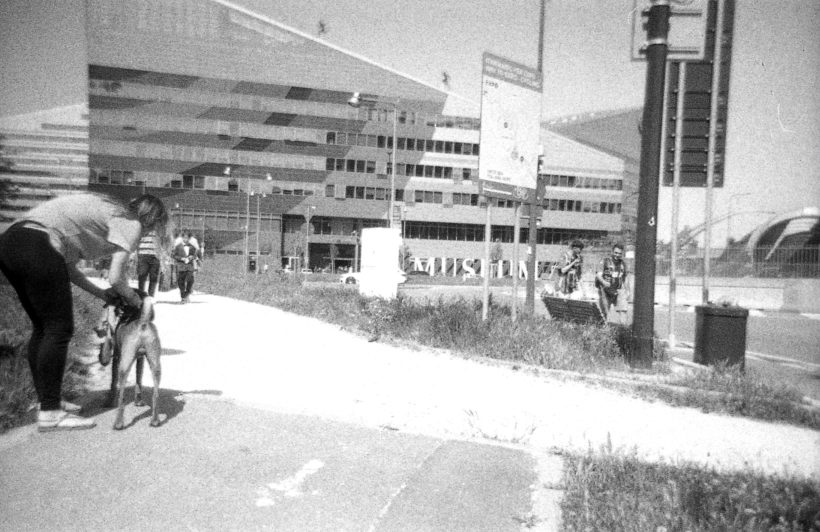Whenever I meet Merule, a 42-year-old Nigerian citizen living undocumented in Milan, Italy, I am struck by the number of people he knows. Merule’s social network unfolds throughout San Siro, a square-shaped, public housing project in Milan’s northwestern area. Walking through San Siro’s long two-way boulevards or taking one of its side streets unravelling from the central square, Merule always greets someone. For each of them, he has a story to tell: a man who sold him his bike, another who sustained him financially in the past, a third who provided a short-term, informal job. Merule is always grateful for the help he receives; he says more than once that the people he meets are ‘gifts from God’. The district is an island of marginalisation in a rich and vibrant urban context (Grassi 2022), serving as a hub for migrants who enter Italy without a visa. The area is marked by widespread unemployment and great inequality (Codici Ricerche 2020). Nevertheless, San Siro is also a place where NGOs, associations, civic committees, and volunteers give birth to forms of sociability that maintain local welfare services for the poor and the most marginalised.

San Siro is a ‘super-diverse’ district, hosting migrants from 85 countries. People have different legal statuses; many have a work-related residence permit, while others, like Merule, remain undocumented. Six apartments host people who have been granted political asylum.
It is the feeling of being trapped in a bureaucratic chaos that produces absurdity.
It was in this neighbourhood, in 2019, that I first met Merule – a fictional name he chose – as he swam into the depths of Italy’s state bureaucracy, seeking legal status. Since then, Merule and I have realised that the Italian migration system is so laden with opacity, requirements, and internal contradictions that it deserves to be labelled an absurd institution. It is the feeling of being trapped in a bureaucratic chaos that produces absurdity. To make any headway in a system that combines complexity with rigidity, most people resort to informal means. Without such informality, people risk being stuck in limbo for years without any chance of obtaining or regaining legal status, especially once lost. Paperwork, whether linked to work or housing, enhances the sense of absurdity, given the number of documents produced and the blatant inconsistency of their content. The inconsistencies and ‘functional dysfunctionality’ of border regimes are widely recognised in anthropology (see, for instance, DeGenova 2002; Fassin 2011); here, my focus is on the link between the Italian immigration system and Merule’s subjective experience.

Merule’s story unfolds between Milan and Lagos, the Nigerian city he comes from. However, the ‘multi-scalar space’ he used to inhabit (Glick Schiller 2015) has gradually diminished to the point that Merule now barely moves out of San Siro. In this sense, his condition is similar to many low-income working families living there. I am aware that many migrants try to resist structural limitations by continuing to cross borders illegally. Nevertheless, Merule’s case is different. He wished to regularise his position in Italy and, in this attempt to conform, he experienced the absurdity of being forced into illegality.
The reduction of Merule’s mobility is directly connected to his legal status. He entered Italy with an invitation letter from an aunt living in a small town southeast of Milan, who hosted him and made him work at a newsstand she ran with her husband. Merule recounts the moment he received the invitation letter:
When I got this letter in 2009, they said they needed me in Italy… My mom talked to me; we had nothing. We had no money to buy anything. So, my mom went to some associations that could lend her money. We borrowed money, started this process, bought the ticket … all the procedures to come to Italy.
Until 2011, Merule moved between Italy and Nigeria thanks to his working visa, but in 2012, things shifted drastically. After having a disagreement with his aunt’s husband, he moved to the southern side of San Siro to another relative’s apartment. He planned to start a new life there, but his situation with the Italian migration system changed with the expiration of his work visa. At the end of July 2012, he filed a request to renew his work visa. In March 2013, a communication from the Milan Immigration Office rejected his application, stating that, after consideration, he “[had] never received income from lawful sources, so, in fact, [he] had already largely benefited from the possibility of residing in the national territory for reasons of pending employment.”
Merule asked an attorney based in Milan for help understanding the reason behind the rejection. In July of the same year, the attorney sent a communication to the Immigration Office stating that Merule had been living in a difficult situation due to the difficulties of securing a job. The letter asked the Immigration Office to grant him more time to seek stable employment. In September 2013, they received a negative response. The Immigration Office stated that, upon further inspection, Merule had failed to pay income tax and file his tax returns. These acts constituted a possible felony. Merule was then ordered to “report within 15 working days of the notification of this order to the Border Police of Malpensa [airport] to leave the Italian territory.” Merule fell into despair and anguish.

During one of our meetings, I tried to understand why Merule was denied a new residence permit. At the time, I thought he had been legally hired to work at the newsstand, but his documents told a different story. Merule’s aunt had registered Merule as a domestic helper even though she had given him work at her newsstand. Unbeknownst to Merule, she had never paid income tax. Moreover, I was shocked when I read the contract’s expiration date: February 31, 2010! I was amazed by this blatant inconsistency, as the contract had been submitted to the Social Provision Institute’s web portal and, as such, had been recognised as valid for an extra two years.
A common migration story
Ethnographic literature has long demonstrated how migrants navigate (Tuckett 2016) national immigration regimes to maximise their chances of obtaining legal status through informal and sometimes illegal practices (Calavita 2005; Düvell 2008; Menjivar 2006; Tuckett 2018). People resort to informal brokers and licit organisations to move through the inconsistencies of the migration apparatus (Feldman 2011). Merule’s aunt had the necessary know-how to create a fictional story through paperwork.
When his renewal application was rejected, Merule’s social and physical mobility collapsed. He started residing in San Siro after realising he could no longer rely on his aunt and uncle. There, he started looking for informal jobs and sending letters to Questura and Prefettura (the local Police and Home Department headquarters), leaving San Siro only to look for work or attorneys willing to help him out. In theory, the police could deport him at any time. Gradually, Merule became one of those undocumented migrants that the internal border control system manages through regular arrests and identity checks (Fabini 2017). Merule did not really belong to the host society, nor was he entirely excluded. He expressed the feeling of being trapped in this limbo with words I found poetic: “Unfortunately, I was left like this. Stuck,” he told me. “I am like someone in between heaven and earth!” Between 2012 and 2019, he received two expulsion decrees for living in Italy without legal status; years later, after an ID control, he was arrested and taken to the local police station, where he spent the night but was later released. In addition, his quest for a secure shelter put him in precarious and potentially dangerous situations.
I met someone there who took me to a house, like a squatter house. I met someone who – it was some guys who were occupying a house. They were Egyptians. It was risky to stay there because I know it’s a squatter house, but at least it was a place to camp, to be able to do my thing. I went in, saw that it was full of garbage cans, and did everything: washed, cleaned, and everything. They were messing around. They wouldn’t let me sleep. They were going back and forth. They were also doing drugs, drinking at night, dealing… I thought I couldn’t stay in that situation.
Squatting is a well-known phenomenon in San Siro and, more broadly, across Milan. Informal networks of migrants and Italians break into the many empty apartments of the public housing blocks and collect money to let people stay there. Others start squatting to solve their troubles, because the Regional Public Housing Stock Agency (ALER) have registered them as ‘irregular,’ after breaking the administrative rules (Cancellieri 2018). I had heard rumours about people squatting in cellars and attics. That was the temporary solution Merule had found.

Someone told me, “If you want a place, go in this cellar…” I would rather stay below, in the cellar. I couldn’t get on with them. I went into the courtyard, in courtyard number 3. There’s a cellar at each entrance of the gate. I was directed there, “There is such and such a place; if you look there, you’ll find a cellar that is a little warm so that even when it is cold, you feel it less.” And I went in there, into that cellar. I saw it was pretty clean, so I cleaned it up nicely and stayed there.
After weeks of squatting in the cellar and secretly showering in the temporary bathroom of a construction site, Merule was found by a middle-aged Italian man who hosted him in his apartment in exchange for some cleaning and care work. When the man died, Merule stayed in the condo and resisted eviction from the public housing agency representatives. When I first met him in 2019, he was still looking for a legal pathway to obtain a residence permit; he would finally do so by enrolling in a regularisation process that opened in the Spring of 2020 (Pontiggia, forthcoming).
Trapped by the law
Merule’s story indicates how Italian migration management works in practice. The first dimension that creates absurdity is how the law often traps migrants in informal or illegal situations during their stay in the country. In this sense, the material dimension of bureaucracy (Gupta 2012; Hull 2012; Riles 2006) can produce fear, anxiety, and despair in those trying to make a living in Italy. Merule recounts his experience with the Italian immigration regime with words that describe the illegibility he found in the regime’s enforcement:
We listened to different lawyers, I went to the Police at that time. Rather than do the right thing for me, those guys wrote me a deportation decree. But these are crazy, these people. Around, the Police checked me, and I got the deportation decree almost three times. What have I done? I’m not a criminal, I didn’t come in a criminal way here. I came as one who has to enter Europe, I paid, what do you want, that I still pay? I had to pay with my soul, I had to die. Hell no!
The result is an absurdity that resonates at the level of national politics: rules established to promote legal immigration to Italy result in social suffering, informality, and exclusion from the host society.
The second dimension is related to social and physical mobility. Once again, Merule’s fate serves as an illustration. The state of undocumentedness and the rigidity of norms that neither tolerate mistakes nor the lack of information hinder people from obtaining legal employment, housing, and a socially recognised identity. They also limit the mobility of undocumented migrants. Merule increasingly concealed himself from local and national authorities, begged for money, and relied on formal and informal networks to survive for more than ten years. The result is an absurdity that resonates at the level of national politics: rules established to promote legal immigration to Italy result in social suffering, informality, and exclusion from the host society.

Merule is still waiting for a positive resolution as of the time of writing. Meanwhile, he resorts to my aid and that of some local associations for food and clothes. He fears that he will someday be evicted from the apartment where he continues to squat.
References
Calavita, K. 2005. Immigrants at the Margins: Law, Race, and Exclusion in Southern Europe. Cambridge: Cambridge University Press.
Cancellieri, A. 2018. ‘Occupazioni abitative senza titolo. Pratiche informali, rappresentazioni e politiche istituzionali’, in F. Cognetti and L. Padovani, Perché (ancora) i quartieri pubblici. Un laboratorio di politiche per la casa, Milano: Franco Angeli.
Codici Ricerche 2020. Nil Selinunte Una ricerca di quartiere per il benessere dei minori. Working Paper.
De Genova, N. 2002. ‘Migrant “Illegality” and Deportability in Everyday Life,’ Annual Review of Anthropology, 31, 419-447.
Düvell, F. 2008. ‘Clandestine Migration in Europe’, Social Science Information, 47(4): 479–497.
Fabini, G. 2017. ‘Managing Illegality at the Internal Border: Governing through ‘Differential Inclusion’ in Italy,’ European Journal of Criminology, 14(1) 46–62.
Fassin, D. 2011. ‘Policing Borders, Producing Boundaries. The Governmentality of Immigration in Dark Times,’ Annual Review of Anthropology, 40, 213-226.
Feldman, G. 2011. The Migration Apparatus: Security, Labor, and Policymaking in the European Union. Stanford: Stanford University Press.
Glick Schiller, N. 2015. ‘Explanatory Frameworks in Transnational Migration Studies: The Missing Multi-Scalar Global Perspective,’ Ethnic and Racial Studies, 38(13) 2275-2282.
Grassi, P. 2022. Barrio San Siro. Interpretare la violenza a Milano. Milano: Franco Angeli.
Gupta, A. 2012. Red Tape: Bureaucracy, Structural Violence, and Poverty in India. Durham: Duke University Press
Hull, M.S. 2012. Government of Paper: The Materiality of Bureaucracy in Urban Pakistan. Berkeley: University of California Press.
Menjivar, C. 2006. ‘Liminal Legality: Salvadoran and Guatemalan Immigrants’ Lives in the United States’, American Journal of Sociology, 111(4): 999–1037.
Riles, A. 2006. Documents: Artifacts of Modern Knowledge. Ann Arbor: University of Michigan Press.
Tuckett, A. 2016. ‘Moving On: Italy as a Stepping Stone in Migrants’ Imaginaries,’ Focaal—Journal of Global and Historical Anthropology, 76: 99–113.
Tuckett, A. 2018. Rules, Paper, Status: Migrants and Precarious Bureaucracy in Contemporary Italy. Stanford: Stanford University Press.





